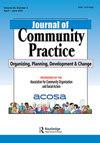城市农业的社区能力建设如何改善以黑人为主的社区的粮食获取
IF 1.2
Q2 SOCIAL WORK
引用次数: 1
摘要
美国黑人面临着与饮食相关的慢性疾病的不同健康负担。生活在无法获得健康食品的社区的美国黑人面临更大的健康结果差异风险。在无法获得健康食品的社区中,城市农业可以补充现有的传统食品体系,并可以在获取新鲜水果和蔬菜方面发挥作用,从而增加水果和蔬菜的消费量。然而,将都市农业纳入当地粮食系统可能具有挑战性。社区能力建设工作有可能促进组织发展,使合作能够加强努力,将都市农业纳入粮食供应不足的社区。本研究使用Chaskin的关系框架来描述社区能力建设努力,以加强以黑人为主的社区的城市农业。我们发现,城市农业社区能力建设的策略包括利用现有资源、社区参与、扩大组织能力、识别社区能力建设的威胁以及确定加强社区能力建设的理想解决方案。城市农民、园丁和倡导者确定了这些策略,通过可持续的城市农业加强当地对食品环境的控制。需要进一步的研究来进一步确定强调可持续性的社区参与战略,例如劳动力发展努力,为新种植者建立网络,以及加强农民,园丁,城市农业倡导者和社区居民之间的联系。本文章由计算机程序翻译,如有差异,请以英文原文为准。
How community capacity building in urban agriculture can improve food access in predominantly Black communities
ABSTRACT Black Americans face disparate health burdens of diet-related chronic diseases. Black Americans who live in communities with inadequate access to healthy foods are at an even greater risk for disparate health outcomes. Urban agriculture in communities with inadequate access to healthy food can complement the existing traditional food system and can make a difference in the accessibility of fresh fruits and vegetables and subsequently, increase fruit and vegetable consumption. However, integrating urban agriculture into a local food system can be challenging. Community capacity-building efforts have the potential to enhance organizational development and enable collaborations to enhance efforts to incorporate urban agriculture into communities with inadequate food access. This study used Chaskin’s relational framework to describe community capacity-building efforts to enhance urban agriculture in predominantly Black communities. We found that strategies for community capacity building in urban agriculture include building on existing resources, community engagement, expanding organizational capacity, identifying threats to community capacity building, and identifying ideal solutions to enhance community capacity-building efforts. Urban farmers, gardeners, and advocates identified these strategies to strengthen local control of the food environment through sustainable urban agriculture. Additional research is needed to further identify community engagement strategies that emphasize sustainability, such as workforce development efforts, building networks for new growers, and strengthening connections between farmers, gardeners, urban agriculture advocates, and community residents.
求助全文
通过发布文献求助,成功后即可免费获取论文全文。
去求助
来源期刊

Journal of Community Practice
SOCIAL WORK-
CiteScore
2.40
自引率
18.20%
发文量
27
期刊介绍:
The Journal of Community Practice is an interdisciplinary journal grounded in social work. It is designed to provide a forum for community practice, including community organizing, planning, social administration, organizational development, community development, and social change. The journal contributes to the advancement of knowledge related to numerous disciplines, including social work and the social sciences, urban planning, social and economic development, community organizing, policy analysis, urban and rural sociology, community health, public administration, and nonprofit management. As a forum for authors and a resource for readers, this journal makes an invaluable contribution to the community"s conceptualization, applications, and practice.
 求助内容:
求助内容: 应助结果提醒方式:
应助结果提醒方式:


